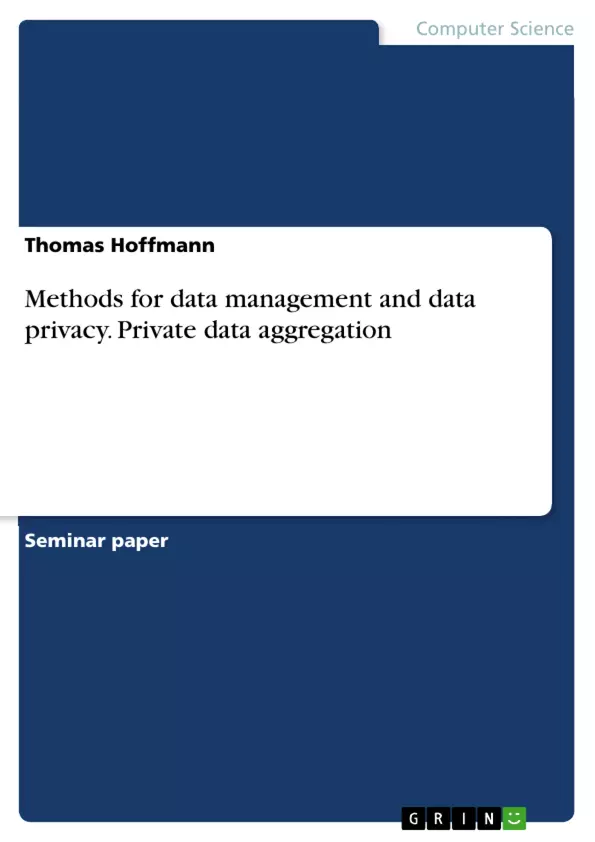Following the nuclear disaster in Fukushima in 2011, the German federal government has decided to shut down half of the existing nuclear power plants in Germany immediately and to not have any nuclear power plants at all running by 2022. To compensate the loss of energy, formerly produced by these power plants, many solar collectors, windmills and other sources of renewable energy
are being installed. So instead of having a few big power plants, delivering a predictable amount of energy at all time, the situation will soon be a decentralized grid of less powerful energy sources whose production is dependent on the weather. Also, many of those solar collectors are owned by the general public and are not under the direct control of any big utility company.
Inhaltsverzeichnis (Table of Contents)
- Introduction
- Smart meter requirements
- Cryptographic operations
- Peer-to-Peer communication
- Digital certificates
- Components for privacy-preserving data aggregation
- Trusted third party
- Secret sharing
- Masking
- Homomorphic encryption
- Fault-tolerant and privacy-preserving data aggregation
- Proactive fault-tolerant aggregation protocol
- Multiparty computation under multiple keys
- Comparison
- Conclusion
Zielsetzung und Themenschwerpunkte (Objectives and Key Themes)
This work aims to present protocols for aggregating energy consumption data from multiple smart meters. These protocols aim to protect the privacy of individual households while still providing the utility provider with the necessary information about the overall energy consumption in a specific region. The key themes explored include:- Privacy concerns related to smart meter data
- Data aggregation techniques for preserving privacy
- Cryptographic primitives and their application in privacy-preserving data aggregation
- Fault-tolerant and privacy-preserving aggregation protocols
- Comparison of different aggregation protocols
Zusammenfassung der Kapitel (Chapter Summaries)
- Introduction: The chapter introduces the shift towards renewable energy sources and the increasing reliance on smart meters. It highlights the need for privacy-preserving data aggregation techniques to address the potential privacy risks associated with detailed energy consumption data.
- Smart meter requirements: This chapter outlines the requirements for smart meters, emphasizing the need for cryptographic operations, peer-to-peer communication, and digital certificates to ensure secure and privacy-preserving data exchange.
- Components for privacy-preserving data aggregation: This chapter introduces key cryptographic primitives commonly used in privacy-preserving data aggregation, including trusted third-party approaches, secret sharing, masking, and homomorphic encryption. It provides brief examples of how these components can be implemented in aggregation protocols.
- Fault-tolerant and privacy-preserving data aggregation: This chapter delves into two specific protocols for fault-tolerant and privacy-preserving data aggregation, exploring their features, advantages, and limitations.
Schlüsselwörter (Keywords)
The main keywords and focus topics of this work include smart grid, data privacy, private data aggregation, smart meters, cryptographic operations, homomorphic encryption, secret sharing, trusted third party, fault-tolerant aggregation, and multiparty computation.Frequently Asked Questions
Why is data privacy important for smart meters?
Smart meters collect detailed energy consumption data that could reveal personal habits and household activities, making privacy protection essential.
What is homomorphic encryption?
Homomorphic encryption is a cryptographic method that allows computations to be performed on encrypted data without needing to decrypt it first, preserving privacy during aggregation.
What are the main components of privacy-preserving data aggregation?
Key components include trusted third parties, secret sharing, masking techniques, and homomorphic encryption protocols.
How do fault-tolerant protocols work in smart grids?
Fault-tolerant protocols ensure that the data aggregation process can still be completed even if some smart meters are offline or fail to send data.
What role do digital certificates play in smart meter security?
Digital certificates are used to authenticate smart meters and ensure that the data being exchanged is secure and comes from a verified source.
- Quote paper
- Thomas Hoffmann (Author), 2014, Methods for data management and data privacy. Private data aggregation, Munich, GRIN Verlag, https://www.grin.com/document/283874



